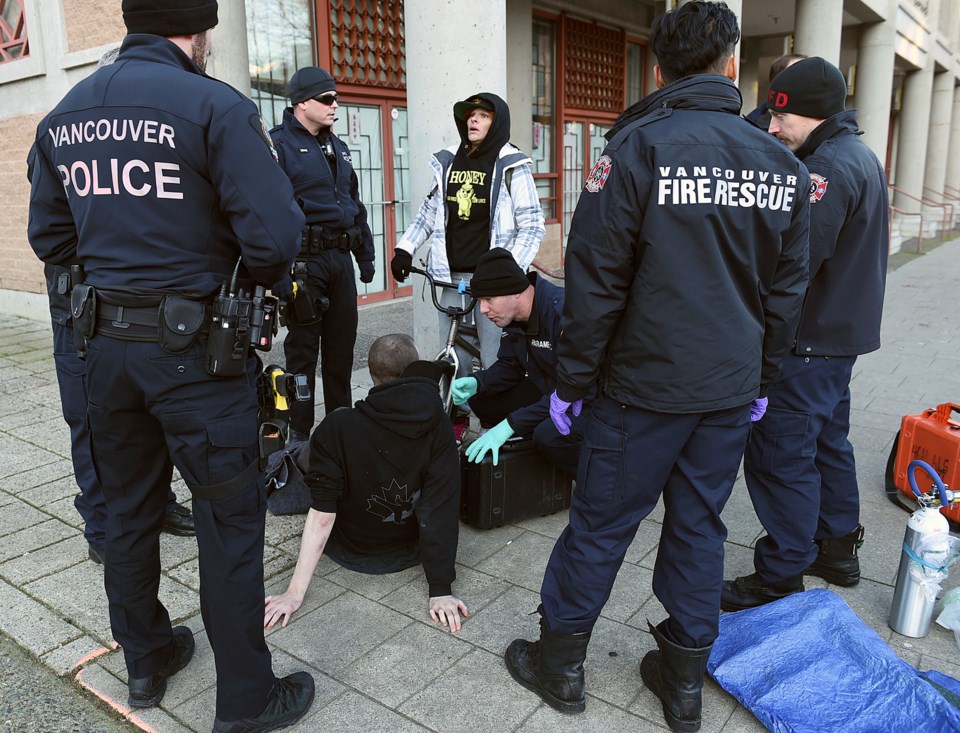The mounting death toll from the opioid crisis in B.C. and Ontario has been cited as a likely factor as to why male life expectancy in Canada has not increased for the third consecutive year.
Statistics Canada announced in a report Jan. 28 that life expectancy for males has remained unchanged across the country at an average of 79.9 years, while female life expectancy increased from 84 to 84.1 years.
In 2015, when life expectancy for males in B.C. was at 80.5 years, it was the highest in the country. That same year, however, overdose deaths increased in B.C. from 529 to 1,542 in 2018.
“For males, the stagnation observed in 2016, 2017 and 2018 is the longest on record,” said the report, which excludes data from 2019.
“Since Canada started recording information on deaths in 1921, life expectancy has typically increased from one year to the next, both for males and females.”
The report explains the stagnation in male life expectancy by pointing directly to an increase in deaths of men between the ages of 25 and 45.
Their deaths were “likely related to the opioid crisis affecting certain regions of the country,” said the report, which identifies B.C. and Ontario as provinces hit hardest by overdose deaths.
Data from B.C. and Ontario supports the report’s conclusion.
Between July 2017 and June 2018, there were 1,350 confirmed opioid-related deaths in Ontario, according to a Public Health Ontario report released in June 2019.
In B.C., 1,226 of the 1,495 drug deaths in 2017 were connected to the deadly synthetic opioid, fentanyl. In 2018, a total of 1,337 of the 1,542 deaths involved fentanyl.
In both provinces, it was men aged 20 to 49 who accounted for the highest percentage of overdose deaths, according to data from Public Health Ontario and the BC Coroners Service.
In B.C., data has shown year over year that men die of an overdose at a much greater rate than women. In 2018, for example, 1,233 males and 309 females died in B.C. of an overdose.

Andy Watson, a spokesperson for the BC Coroners Service, said close to 5,000 British Columbians have died in the province since 2016 of an overdose, with males accounting for four out of every five deaths.
“I wouldn’t say it surprises us that a national body would make a statement that there’s a likelihood the life expectancy rate has either stagnated or decreased for males in B.C.,” Watson said.
“We know right now that the drug supply is toxic, and because it’s unregulated, people are really gambling when they’re using substances.”
Vancouver has been the B.C city hit hardest by overdose deaths, with 1,001 recorded between January 2016 and December 2018. Surrey had 512 for the same period, followed by Victoria at 260.
The B.C. Coroners Service is expected to release data this month on the total number of deaths for 2019. The agency’s last report covered the first 10 months of 2019, which showed 823 people died of an overdose in the province; 210 occurred in Vancouver.
Dr. Patricia Daly, chief medical health officer for Vancouver Coastal Health, said the decrease in deaths last year is encouraging news, but noted the number of overdose calls to emergency responders is holding steady.
“The death rate has come down and we’re quite certain it’s because of certain things we’ve done, but we haven’t done enough,” said Daly, referring to various initiatives by the health agency and others, including opening injection sites and increasing the distribution of the overdose-reversing drug naloxone.
The Ministry of Mental Health and Addictions said in an emailed statement Monday that government-led strategies, including access to opioid agonist treatment, have averted an estimated 4,700 deaths.
“Stats Canada data helps inform our approach to addressing this crisis, including how important it is to reach those at the highest risk of overdose,” said the statement, noting the ministry has partnered with the Vancouver Canucks, B.C. Lions and Vancouver Warriors in campaigns to reach men between the ages of 30 and 59.
“There are no simple answers and no silver bullet to solve this crisis. But we are not giving up. We’re going to keep escalating our response to this crisis to save more lives and connect more people to the mental health and addictions supports they need.”
Data released from the Government of Canada in December showed more than 13,900 apparent opioid-related deaths occurred in the country between January 2016 and June 2019.
In addition, between January 2016 and March 2019, the same data collection report showed more than 17,000 hospitalizations for “opioid-related poisoning” occurred in Canada.
@Howellings



